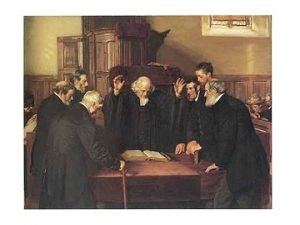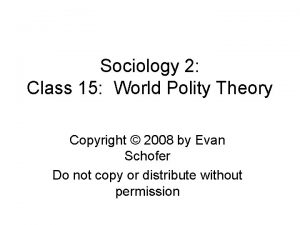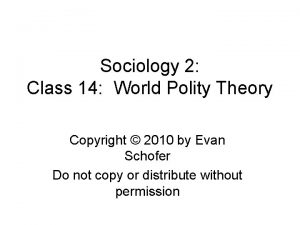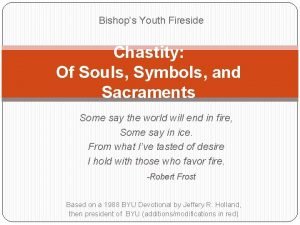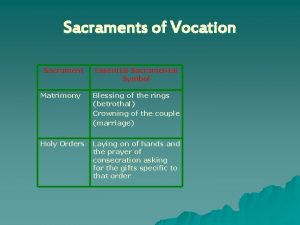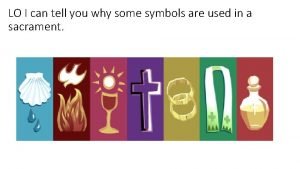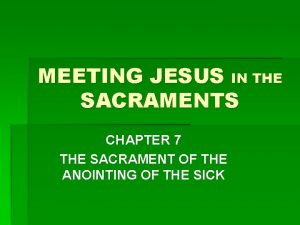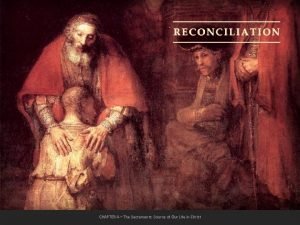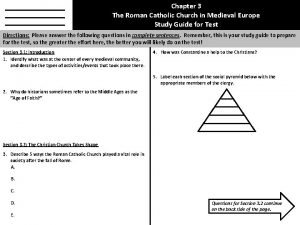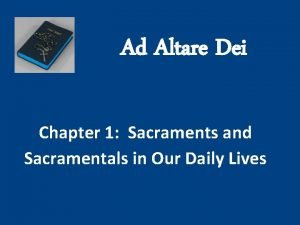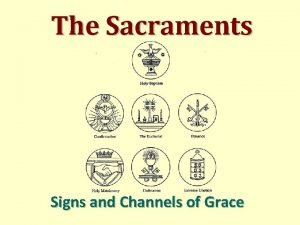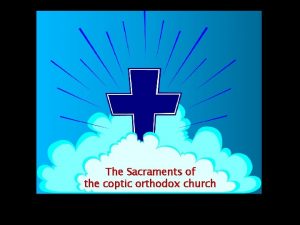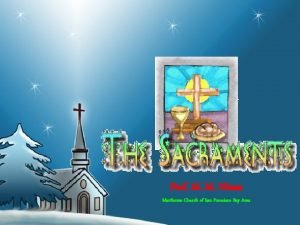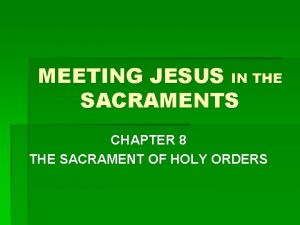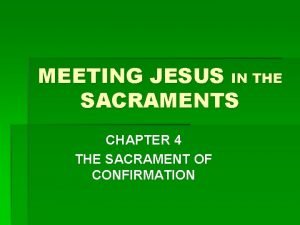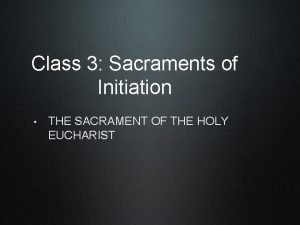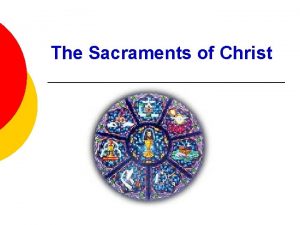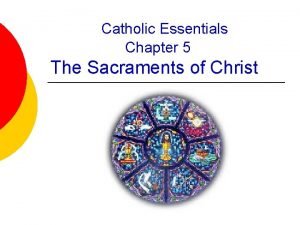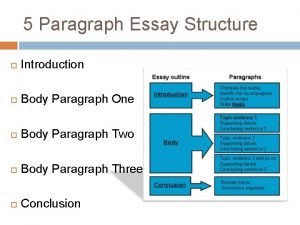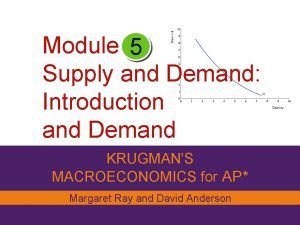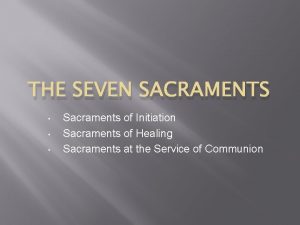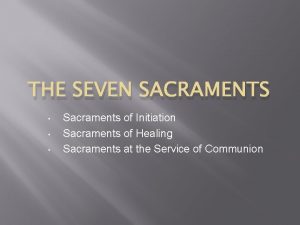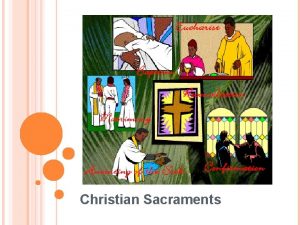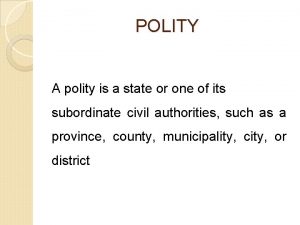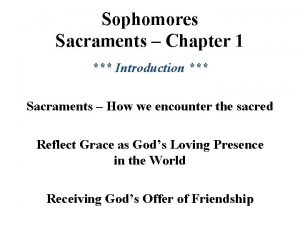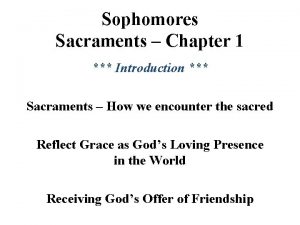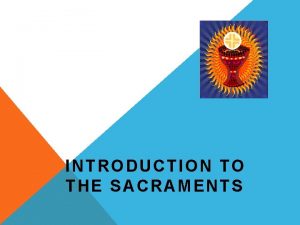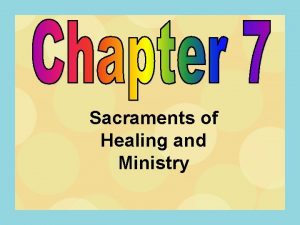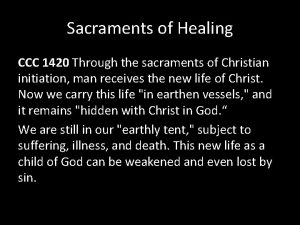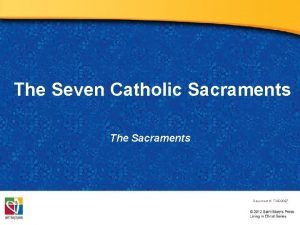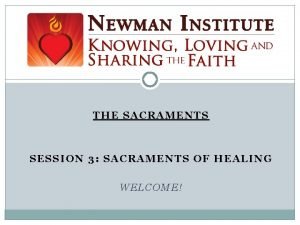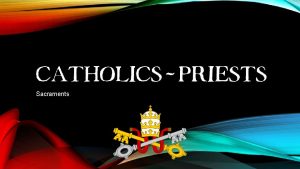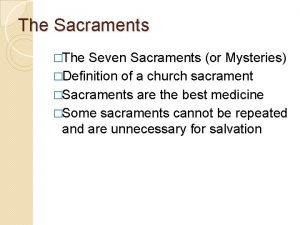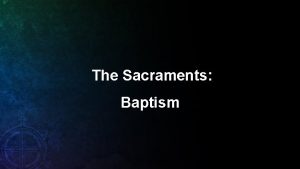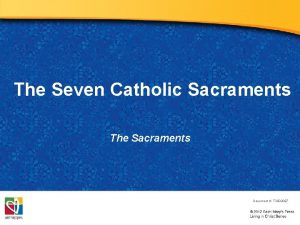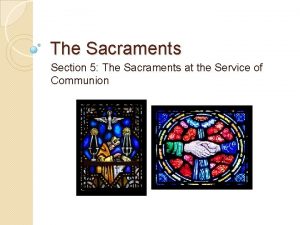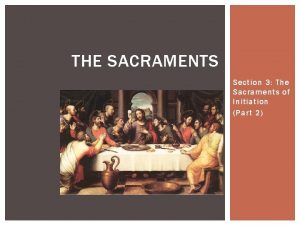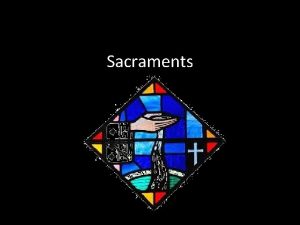An Introduction to Polity and Sacraments Polity How




























- Slides: 28

An Introduction to Polity and Sacraments

Polity, How We Govern • Episcopal (Roman Catholic, Eastern Orthodox, Anglican)—authority in the bishops (from Greek episcopos, “overseer”) • Congregational (UCC, many Baptists, EFCA)—authority in the local congregation (typically in some sort of church board or council)

Polity, How We Govern, cont’d • “Connectional”—PC(USA), RCA, CRC, authority in councils of presbyters elected by the people (not appointed by the State) – Church of England • God calls; the people choose; Christ appoints – It’s the Spirit! • Congregations gather together in presbyteries, presbyteries in synods and in General Assembly (GA)

Polity, How We Govern, cont’d • A sign of the unity of the church – one call, one mission in which all participate, building up one another to glorify God – Connection, cooperation, collaboration

Polity, How We Govern, cont’d • Congregations elect their ruling elders, the session • Presbyteries elect representatives to synod • Representatives elected by their presbyteries come together every two years for the General Assembly

Polity, How We Govern, cont’d • Synods provide resources for and oversee presbyteries • Presbyteries provide resources for and oversee congregations • General Assembly (GA) oversees the entire church

Polity, How We Govern, cont’d • A teaching elder is a member of his or her presbytery, not of the congregation he or she serves. . . • Session, presbytery, synod, and General Assembly are known as councils • Councils are called to nurture, guide, and govern • . . . to be active participants in the strengthening of the church and to give glory to God

Presby-this, Presby-that! • Presbyterian, presbyter, from Greek presbuteros, “elder” • Teaching elder (Minister of Word and Sacrament)—preaches and administers sacraments • Ruling elder—exercises discipline (encouraging Christian living and counseling with those who stumble)

Officers & Meetings • The pastor is the moderator of session, presiding at meetings of the session and the congregation • If the pastor is unable to preside at a particular meeting, he or she shall invite another teaching elder in the presbytery (or someone designated by the presbytery) to preside

Officers & Meetings • The moderator convenes and adjourns meetings and ensures that meetings are conducted in an orderly, efficient, and timely manner – and civilly, too!

Officers & Meetings • Each council elects a clerk to take and keep the minutes of its meetings, to maintain membership rolls, and to preserve its records • Clerk of session must be a ruling elder elected by the session (term determined by session)

Meetings • Council meetings open and close with prayer • Meetings shall adhere to parliamentary procedure (Robert’s Rules of Order)— motions, seconds, etc. • The point?

Meetings • Annual congregational meeting/s – – Electing elders, deacons Approving pastor’s terms of call Receiving reports (Does not adopt a budget—session’s responsibility) • Special congregational meeting – Calling a pastor – Dissolving a pastoral relationship • All active members present entitled to vote • Quorum is set by congregational rule

Session • All members of session entitled to vote • Shall not meet without a moderator (pastor, other teaching elder from presbytery invited by pastor, or person appointed by presbytery) • Session elects a commissioner to presbytery; the commissioner is a ruling elder; term should be at least one year

Session • Session may nominate to the presbytery ruling elders from the congregation to serve on presbytery teams or as commissioners to synod and General Assembly

Session • Stated meetings at least quarterly – “stated, ” publicly announced to the congregation (in written or oral form) with adequate, considerate notice • Quorum set by session – Must include moderator • Session elects a treasurer – Treasurer need not be an elder

Session • Some specially theological/pastoral concerns – Session has special care for ensuring the Word of God is truly preached and heard – Session has special care for the right administration of the Sacraments – Session has special care for encouraging Christian living among the congregation’s members and for counseling with those members who stumble

Outline of a Session Meeting (Clerk typically sets agenda in consultation with pastor) • Open with prayer • Review and approve minutes of last meeting – Approval by unanimous consent (“If there is no objection. . . ”) • Officers’ reports (clerk, pastor, treasurer) • Committee/Team reports

Outline of a Session Meeting • Unfinished/Old business – Matters left unresolved at an earlier meeting • New business – New items – Items “tabled” earlier in the same meeting • Close with prayer

A Motion • • Proposes an action to the body Requires a second Discussion Vote • “for the record”

Sacraments (There are two: Baptism, Lord’s Supper In them, God is • Sealing • Renewing • Marking In them, we are • Receiving • Remembering • Pledging

Sacraments It’s the Spirit!

Sacraments, Baptism • Baptism, the sign and symbol of inclusion in God’s grace and covenant with the Church – – – – God’s faithfulness Washing away of sin Rebirth Putting on Christ Sealed by the Spirit Adoption Resurrection and illumination in Christ

Sacraments, Lord’s Supper • Lord’s Supper, sign and seal of eating and drinking in communion with the crucified and risen Lord • Body and blood—signs of the new covenant

Sacraments, Lord’s Supper • Thanksgiving, “eucharist” • Remembering • Calling upon the Spirit

Sacraments, Lord’s Supper • • Roman Catholic, “transubstantiation” Lutheran, “consubstantiation” Zwinglian, memorial meal Calvin. . .

Sacraments It’s the Spirit!

Sacraments • Lord’s Supper shall be celebrated regularly and frequently • Always and only as approved by the session (Baptism, too) • Taking Communion to those physically unable to attend worship. . . • What to do with the leftovers?
 The umayyads and the centralisation of polity
The umayyads and the centralisation of polity Church polity definition
Church polity definition World polity theory example
World polity theory example Tribal polity in rig veda
Tribal polity in rig veda Criticism of modernization theory
Criticism of modernization theory Bureaucratic polity adalah
Bureaucratic polity adalah Of souls symbols and sacraments
Of souls symbols and sacraments Seven sacraments symbols
Seven sacraments symbols Sacrament of vocation
Sacrament of vocation Reconciliation signs and symbols
Reconciliation signs and symbols Meeting jesus in the sacraments chapter 1
Meeting jesus in the sacraments chapter 1 Meeting jesus in the sacraments chapter 1 crossword
Meeting jesus in the sacraments chapter 1 crossword Acrament
Acrament 7 sacraments catholic
7 sacraments catholic Catholic essentials chapter 1 crossword answers
Catholic essentials chapter 1 crossword answers Holy orders form
Holy orders form 7 sacraments orthodox church
7 sacraments orthodox church 7 sacraments marthoma
7 sacraments marthoma Meeting jesus in the sacraments chapter 2
Meeting jesus in the sacraments chapter 2 Meeting jesus in the sacraments chapter 3
Meeting jesus in the sacraments chapter 3 Ccc 1359
Ccc 1359 What is sacrament
What is sacrament Sacramental principle
Sacramental principle Seven sacraments
Seven sacraments The eucharistic prayer catholic
The eucharistic prayer catholic Intro paragraph outline
Intro paragraph outline Module 5 supply and demand introduction and demand
Module 5 supply and demand introduction and demand Benvolio quotes act 1, scene 1
Benvolio quotes act 1, scene 1 Disadvantages of aims and objectives
Disadvantages of aims and objectives

